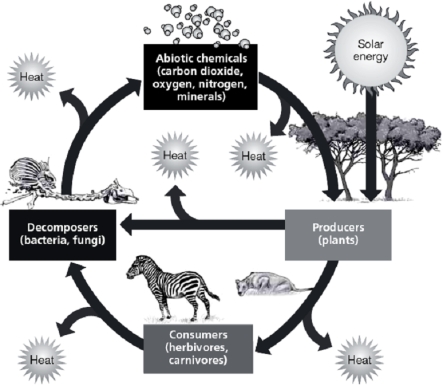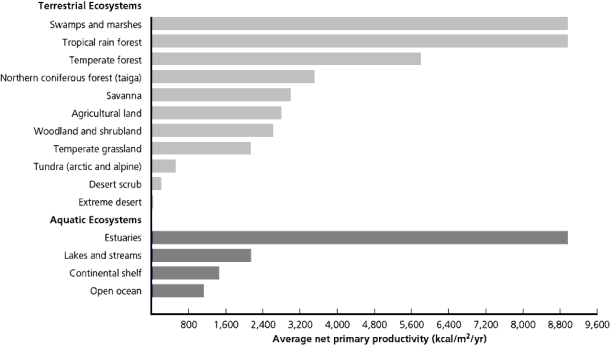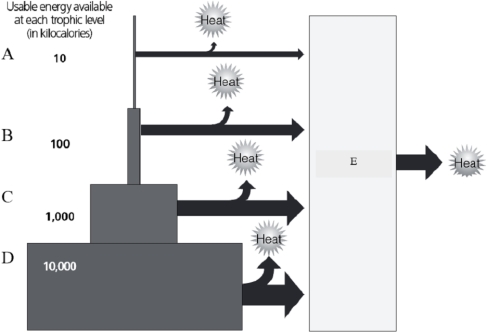Exam 3: Ecosystems: What Are They and How Do They Work
Exam 1: Environmental Problems, Their Causes, and Sustainability100 Questions
Exam 2: Science, Matter, Energy, and Systems102 Questions
Exam 3: Ecosystems: What Are They and How Do They Work110 Questions
Exam 4: Biodiversity and Evolution104 Questions
Exam 5: Biodiversity, Species Interactions, and Population Control100 Questions
Exam 6: The Human Population and Its Impact111 Questions
Exam 7: Climate and Biodiversity100 Questions
Exam 8: Aquatic Biodiversity109 Questions
Exam 9: Sustaining Biodiversity: the Species Approach100 Questions
Exam 10: Sustaining Terrestrial Biodiversity: the Ecosystem Approach108 Questions
Exam 11: Sustaining Aquatic Biodiversity122 Questions
Exam 12: Food, Soil, and Pest Management118 Questions
Exam 13: Water Resources115 Questions
Exam 14: Geology and Nonrenewable Mineral Resources115 Questions
Exam 15: Nonrenewable Energy102 Questions
Exam 16: Energy Efficiency and Renewable Energy103 Questions
Exam 17: Environmental Hazards and Human Health103 Questions
Exam 18: Air Pollution112 Questions
Exam 19: Climate Disruption and Ozone Depletion111 Questions
Exam 20: Water Pollution114 Questions
Exam 21: Solid and Hazardous Waste108 Questions
Exam 22: Cities and Sustainability99 Questions
Exam 23: Economics, Environment, and Sustainability104 Questions
Exam 24: Politics, Environment, and Sustainability90 Questions
Exam 25: Environmental Worldviews, Ethics, and Sustainability55 Questions
Select questions type
 -In the figure above, notice that heat is lost by each component of the ecosystem, and that the sun is shown entering at only one point in the system.Explain how this is representative of the two laws of energy (two laws of thermodynamics).
-In the figure above, notice that heat is lost by each component of the ecosystem, and that the sun is shown entering at only one point in the system.Explain how this is representative of the two laws of energy (two laws of thermodynamics).
(Essay)
4.9/5  (25)
(25)
Ecologists do not make use of most new technologies, preferring to continue the "muddy-boots biology" style of research.
(True/False)
4.9/5  (31)
(31)
Transfer of energy through food chains or webs is very efficient, making a lot of energy available to organisms.
(True/False)
4.8/5  (32)
(32)
Most producers capture sunlight to produce energy-rich carbohydrates through photosynthesis.
(True/False)
4.9/5  (41)
(41)
How much of the earth's water supply is available as accessible liquid freshwater?
(Multiple Choice)
4.7/5  (27)
(27)
 -Examine the figure above.Notice the amount of average net primary productivity gets smaller and smaller as you move down the list of terrestrial ecosystems and, similarly, in the list of aquatic ecosystems.What is the common factor in the terrestrial system that causes the decline? What is the common factor in the aquatic system that causes the decline there?
-Examine the figure above.Notice the amount of average net primary productivity gets smaller and smaller as you move down the list of terrestrial ecosystems and, similarly, in the list of aquatic ecosystems.What is the common factor in the terrestrial system that causes the decline? What is the common factor in the aquatic system that causes the decline there?
(Essay)
4.8/5  (34)
(34)
The reason we observe a "pyramid" of energy flow instead of an energy flow "cube" is because the low ecological efficiency of biological systems limits the numbers of organism in the higher trophic levels.
(True/False)
4.9/5  (36)
(36)
A group of individuals of the same species living in the same place at the same time is a(n) ____________________.
(Short Answer)
4.8/5  (30)
(30)
Destruction of tropical rain forests will help accelerate ____________________.
(Short Answer)
4.7/5  (31)
(31)
Scientists have less than _____ percent of the ecological data they need to evaluate the ecosystems in the United States.
(Multiple Choice)
4.9/5  (39)
(39)
In the plains states of the U.S.(Kansas, Nebraska, Texas, etc.) agricultural withdrawal of groundwater from aquifers has greatly exceeded the supply.Explain why removal of this resource will have long-term effects on the hydrologic cycle.
(Essay)
4.8/5  (40)
(40)
 Use the Figure above to answer the following question(s).
-Indicate the letter at which humans would be found?
Use the Figure above to answer the following question(s).
-Indicate the letter at which humans would be found?
(Short Answer)
4.9/5  (36)
(36)
Which of the following terrestrial ecosystems or life zones produces the highest net primary productivity per year?
(Multiple Choice)
5.0/5  (33)
(33)
Which of the following is a way that humans harmfully impact the water cycle?
(Multiple Choice)
4.9/5  (32)
(32)
Deep sea habitats are an exception to the first principle of sustainability, in that they use a non-solar source of energy.
(True/False)
4.8/5  (31)
(31)
Showing 81 - 100 of 110
Filters
- Essay(0)
- Multiple Choice(0)
- Short Answer(0)
- True False(0)
- Matching(0)